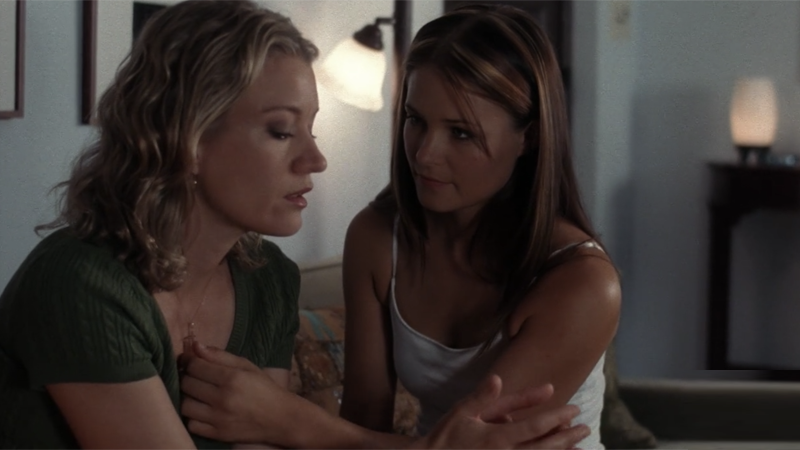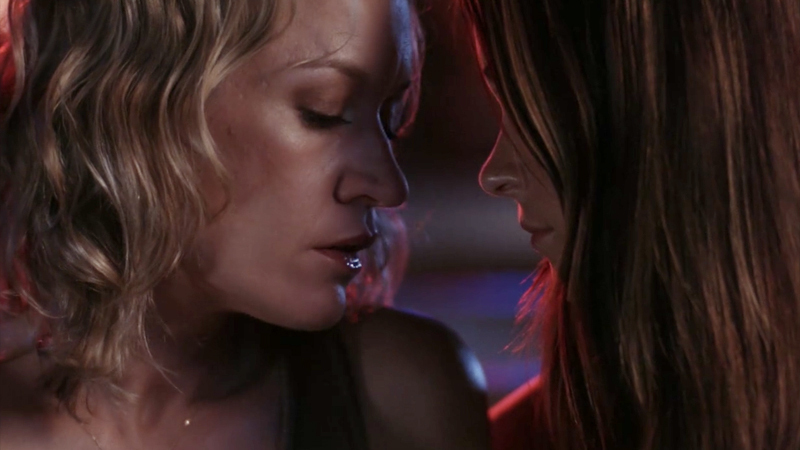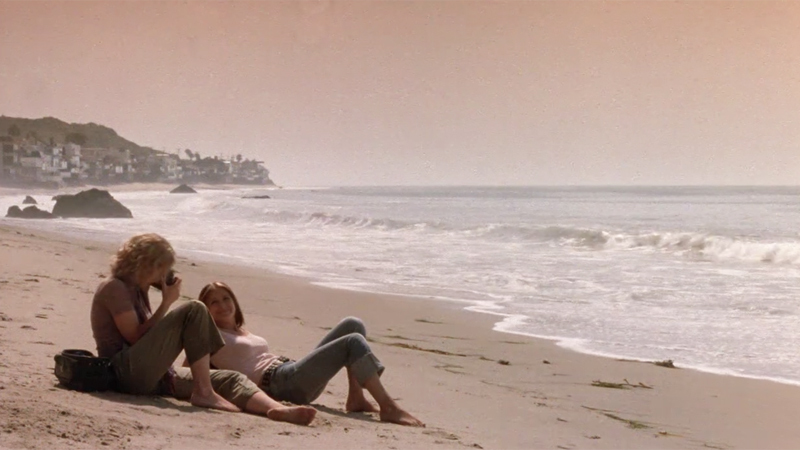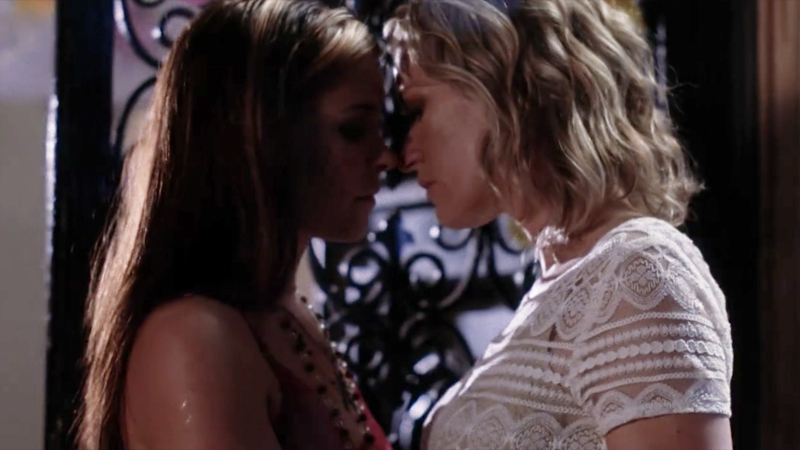In Lost Movie Reviews From the Autostraddle Archives we revisit past lesbian, bisexual, and queer classics that we hadn’t reviewed before, but you shouldn’t miss.
When I desperately clamored to claim Loving Annabelle for our Lost Movie Reviews series, I fully expected to have to give you two reviews in one. And I sort of still will but it’s not quite how I thought it would go. I expected my two reviews to be a review as a teenager in 2006 who loved this movie and a review as a 30-something in 2020 who hated it. But instead I bring you a combination review from my 19-year-old closeted self — a college kid who was just starting to accept that maybe she was legitimately into girls and was consuming as much queer content as she could get her greedy hands on to “make sure” before doing anything so drastic as coming out — who loved this movie, and a review from an adult human lady who professionally reviews queer TV and movies and tries her best to be constantly learning about LGBTQ+ representation and who is vehemently against teacher/student relationships… but still loved this movie.
Because as much as I’d love to pretend I can write this movie off for the problematic aspects, the truth is this movie was vital to my queer evolution and rewatching now as an out and proud queer woman who has consumed thousands of hours of LGBTQ+ content since I first laid eyes on that stripey-haired teen and her shy teacher crush, I was transported to that feeling of excitement and, frankly, hope that this movie once provided me.
The bare bones description of this movie is that Annabelle, the rebellious daughter of a lady senator who seems uninterested in raising her own kid, falls in love with and pursues her soft-spoken poetry teacher at an all-girls Catholic boarding school.
Funnily enough, I’ve been watching a lot of horror movies in quarantine and this movie starts the same way so very many of them do: a long stretch of highway, an endless expanse of trees, someone looking wistfully out the window. And when I started this movie, still expecting to hate it on my first viewing in over a decade, I thought this would be appropriate. Instead I found myself making notes as if I was about to write a college essay analyzing it. “A row of black limos drives up to drop Annabelle off at her new boarding school, looking not unlike a funeral procession.”
It’s wild what an emotional attachment to a film will do to the way your brain processes it.
While I can’t say I would have felt the same way if I watched it for the first time this year, at my age, at my stage of life, watching it now, the reasons I loved it over a decade ago all came back to me. Annabelle has mommy issues and is the edgy “I don’t give a fuck” kind of teenager I always wished I was, even though in reality I was the head-down, get-good-grades, stay-out-of-trouble type. Annabelle was also confident in a way I still can’t quite fathom, and out in a way my 19-year-old self had rarely seen in real life.

When Annabelle comes out to her roommates, they react better than any of my Catholic high school friends had reacted to the hypothetical concept of having a gay friend, and in fact overall better than most of my college friends had when I cautiously mentioned I might not be particularly straight. Annabelle was so out and fine with being gay, watching her felt like being in a desert and someone telling me there was a watering hole up ahead if I just keep going.
And while I saw who I wanted to be in Annabelle, I saw some of myself in Simone. Aware of my sexuality but afraid of it because of the religious environment I was immersed in, waiting for someone to open the closet door and pull me out. Someone a little bolder, a little braver. A little more like Annabelle. And even though now I know that Annabelle was a child and Simone, as a teacher, absolutely should not have done half the things she did in this movie, I was a freshman in college when I first saw this movie, only a year older than Annabelle, and considered myself quite grown, so I didn’t see how problematic that relationship was at that point. (I also knew nothing of the predatory lesbian trope or how the misconception that queer = pervert would be one of the reasons I didn’t end up pursuing the teaching degree I was still a few years away from receiving.)
As an adult, though I obviously find it wildly inappropriate and would never ever condone such activities in real life, in this fictional situation, I can understand the appeal. Annabelle represented the life Simone never had. She was this out and proud teenager while Simone was faking her way through a relationship with a man after being shoved back in the closet, forced to only eye queer couples across the bar longingly.
That scene was also a key factor in me relating to Simone, since the summer before college I went to a party at my friend’s house and there was a lesbian couple there, which I had never seen in real life with my eyes. I knew a few girls in high school who were bisexual but none of them had girlfriends while I knew them, so I had never seen two people my age just casually holding hands or canoodling or wrapping their arms around each other in the hot tub. So I stared, hoping they could sense my curiosity and mental support and didn’t think I was judging them.
Back to the movie, I do want to briefly address the Catherine situation. Annabelle’s classmate is immediately intrigued by Annabelle and her gayness, but Annabelle reproaches all of her attempts to connect about it, which I understand, because Cat had been a jerk up until that point. And when Cat swims up to her in the pool one night and kisses her, Annabelle pushes her away saying, “I’m not interested in being your science project.” Which is frustrating because… surely Annabelle had to have kissed someone for the first time before? The whole idea of being someone’s first “dip in the lady pond” as it were as a negative thing is problematic on its own, but especially from a teeanger? It’s not even like they’d known each other for years and Annabelle knew Cat to be super into boys and was afraid she wasn’t being sincere? It would have been plausible for Annabelle to be like “No thanks you’re a very mean girl.” But, again, this movie was made in 2006 when The L Word made the now-outdated term “gold star lesbian” popular and biphobia wasn’t something we talked about, as a community, nearly enough.
Throughout the rest of the movie I continued to relate to Simone; I too fantasized about girls in church, for example. And Annabelle continued to represent the kind of girl I fantasized about; the kind of girl who would make the first move, for example.

One thing I really liked about this movie was that Simone and Annabelle, ignoring the problematic power dynamic, really did get to know each other and bond before anything ever happened. It wasn’t blind lust or a rushed, drunk decision. They talked about poetry, they spent a week alone together over the spring break, having the whole school and then a beach house to themselves, and never even kissed.

Also I had forgotten how Simone’s ex Amanda died until Annabelle found that letter; but I couldn’t help but find their hug after more poignant than my 19-year-old self gave it credit for; this was probably the first time since Amanda died that Simone was able to truly mourn her, not as a best friend like she had to tell the rest of the world, but as the woman she was in love with. Annabelle was the first person to truly see and understand what she lost.
(Also this is neither here nor there but I am pretty sure the photos of Amanda are writer/director of the movie Katherine Brooks, which I love.)
And I can HEAR myself! I know how this sounds! And I know I wouldn’t be saying these things if the teacher in this situation was a man! I know. This isn’t how I thought this was going to go either.
More things my 90s-raised, secretly gay teenage self appreciated about this movie: “Gravity” by Sara Barelles, secret pinky touching in the dark, chopsticks in Annabelle’s hair, the fashion in general. I didn’t realize how many times I must have watched this movie until the scene at the dance when Annabelle starts singing and the music rocketed me back in time.

The thing that makes my lizard brain want to justify this relationship is that it was always Annabelle who made the first move, but she always stopped when Simone drew the line. And while in the end it was Annabelle who pulled Simone in, she waited for Simone to kiss her first. Consider also the actual sex scene; the push up against the wall, the gentleness of it, the fact that it was very clear what they were doing, sexually, something my 19-year-old self who had only ever drunkenly made out with girls appreciated. It was still Annabelle leading it, the power dynamic shifted. And if this was any other situation but a teacher/student, it would have been absolutely perfect. Because the truth is, even though it’s not as manipulative or toxic as, say, Ezra and Aria from Pretty Little Liars, it is still inappropriate. You can blame my own mommy issues for this review.
I guess the whole time I was watching this I was just like Colins, nervously holding my head up like, “I don’t care if they’re together, I like them both.”
There’s a reason forbidden romances like this spoke to me as a closeted person, and there was something refreshing about the “forbidden” part of this relationship, at the end of the day, having less to do with the fact that they were both women and more to do with the inappropriate teacher/student dynamic. Of course, being set in a Catholic school, there was an undertone of that, but it’s not what it was about.
And the move WAS self-aware. The inappropriateness of the relationship wasn’t TOTALLY swept under the rug. In fact, the movie ends with Simone being hauled away by the police. Of course, there’s an alternate ending where we see Annabelle return to Simone’s beach house, presumably post-graduation and post-turning 18, after reading a headline about how Simone wasn’t charged with anything, probably thanks in part to Annabelle’s mother not wanting this particular scandal on the record. And I wish I could explain to you how it sounds in my head with both sides of my brain (the rational adult side and the angsty teen side) screaming at each other about which ending is better.
I understand why it’s not everyone’s jam, and even why it is sometimes labeled problematic, and if this was a mainstream movie coming out in 2020 I would have a different opinion about it. But the truth is, it was lesbian writer/director Katherine Brooks’ passion project in 2006, made with not a lot of money and even less time, and you can tell it was made by queer people for queer people. It wasn’t made by a straight white cis man to tantalize and scandalize the masses. It was a story for us, and about us. The whole point of the movie was two women in love, for better or worse (okay mostly worse), and even now, 14 years later, we still don’t get that all too often.
So while this may not be the most popular opinion, I cannot deny this movie’s importance in my life specifically, and while I wouldn’t recommend it to someone trying to learn about queer culture, I would recommend it to those of us who are fully entrenched in our queerness and just want to have an angsty good time.
You can watch Loving Annabelle for free on Amazon Prime.
Want more movies? Check out Autostraddle’s 200 Best Lesbian Movies of All Time.







